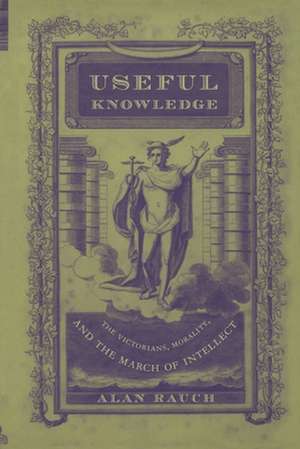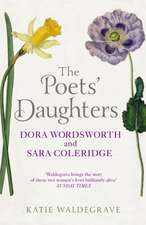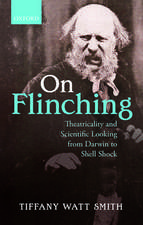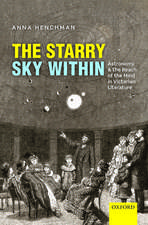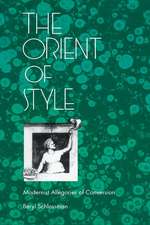Useful Knowledge – The Victorians, Morality, and the March of Intellect
Autor Alan Rauchen Limba Engleză Paperback – 16 iul 2001
Preț: 265.79 lei
Nou
Puncte Express: 399
Preț estimativ în valută:
50.86€ • 53.10$ • 41.100£
50.86€ • 53.10$ • 41.100£
Carte tipărită la comandă
Livrare economică 15-29 aprilie
Preluare comenzi: 021 569.72.76
Specificații
ISBN-13: 9780822326687
ISBN-10: 082232668X
Pagini: 304
Ilustrații: 20 illustrations
Dimensiuni: 152 x 229 x 15 mm
Greutate: 0.49 kg
Editura: MD – Duke University Press
ISBN-10: 082232668X
Pagini: 304
Ilustrații: 20 illustrations
Dimensiuni: 152 x 229 x 15 mm
Greutate: 0.49 kg
Editura: MD – Duke University Press
Recenzii
"A welcome addition to humanistic analyses of science-in-culture. Rauch deftly blends science, history, and literature-novels, speculative fiction, encyclopedias-to explore cultural attitudes to the challenges of new knowledge during the Information Age of the early nineteenth century."- Ann B. Shteir, York University "Useful Knowledge can stand as a model of informed and scrupulous historicism. The breadth of Rauch's acquaintance with subliterary and paraliterary texts is truly impressive as he clearly lays out what was at stake for nineteenth-century intellectuals and usefully relates their preoccupations with those that concern us now, as we experience another information revolution."- Harriet Ritvo, author of The Platypus and the Mermaid, and Other Figments of the Classifying Imagination> Useful Knowledge by >Alan Rauch won the Georgia Writers Association for the best >non-fiction book of 2001
"A welcome addition to humanistic analyses of science-in-culture. Rauch deftly blends science, history, and literature-novels, speculative fiction, encyclopedias-to explore cultural attitudes to the challenges of new knowledge during the Information Age of the early nineteenth century."- Ann B. Shteir, York University "Useful Knowledge can stand as a model of informed and scrupulous historicism. The breadth of Rauch's acquaintance with subliterary and paraliterary texts is truly impressive as he clearly lays out what was at stake for nineteenth-century intellectuals and usefully relates their preoccupations with those that concern us now, as we experience another information revolution."- Harriet Ritvo, author of The Platypus and the Mermaid, and Other Figments of the Classifying Imagination > Useful Knowledge by >Alan Rauch won the Georgia Writers Association for the best >non-fiction book of 2001
"A welcome addition to humanistic analyses of science-in-culture. Rauch deftly blends science, history, and literature-novels, speculative fiction, encyclopedias-to explore cultural attitudes to the challenges of new knowledge during the Information Age of the early nineteenth century."- Ann B. Shteir, York University "Useful Knowledge can stand as a model of informed and scrupulous historicism. The breadth of Rauch's acquaintance with subliterary and paraliterary texts is truly impressive as he clearly lays out what was at stake for nineteenth-century intellectuals and usefully relates their preoccupations with those that concern us now, as we experience another information revolution."- Harriet Ritvo, author of The Platypus and the Mermaid, and Other Figments of the Classifying Imagination > Useful Knowledge by >Alan Rauch won the Georgia Writers Association for the best >non-fiction book of 2001
Notă biografică
Textul de pe ultima copertă
""Useful Knowledge" can stand as a model of informed and scrupulous historicism. The breadth of Rauch's acquaintance with subliterary and paraliterary texts is truly impressive as he clearly lays out what was at stake for nineteenth-century intellectuals and usefully relates their preoccupations with those that concern us now, as we experience another information revolution."--Harriet Ritvo, author of "The Platypus and the Mermaid, and Other Figments of the Classifying Imagination "
Cuprins
Acknowledgements
Introduction: Knowledge and the Novel
1. Food for Thought: The Dissemination of Knowledge in the Early Nineteenth Century
2. Science in the Popular Novel: Jane Webb Loudon’s The Mummy!
3. The Monstrous Body of Knowledge: Mary Shelley’s Frankenstein
4. Lessons Learned in Class: Charlotte Brontë’s The Professor
5. The Tailor Transformed: Charles Kingsley’s Alton Locke
6. Destiny as an Unmapped River: George Eliot’s The Mill on the Floss
Notes
Bibliography
Index
Introduction: Knowledge and the Novel
1. Food for Thought: The Dissemination of Knowledge in the Early Nineteenth Century
2. Science in the Popular Novel: Jane Webb Loudon’s The Mummy!
3. The Monstrous Body of Knowledge: Mary Shelley’s Frankenstein
4. Lessons Learned in Class: Charlotte Brontë’s The Professor
5. The Tailor Transformed: Charles Kingsley’s Alton Locke
6. Destiny as an Unmapped River: George Eliot’s The Mill on the Floss
Notes
Bibliography
Index
